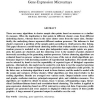Free Online Productivity Tools
i2Speak
i2Symbol
i2OCR
iTex2Img
iWeb2Print
iWeb2Shot
i2Type
iPdf2Split
iPdf2Merge
i2Bopomofo
i2Arabic
i2Style
i2Image
i2PDF
iLatex2Rtf
Sci2ools
161
Voted
JCB
2002
2002
Inference from Clustering with Application to Gene-Expression Microarrays
There are many algorithms to cluster sample data points based on nearness or a similarity measure. Often the implication is that points in different clusters come from different underlying classes, whereas those in the same cluster come from the same class. Stochastically, the underlying classes represent different random processes. The inference is that clusters represent a partition of the sample points according to which process they belong. This paper discusses a model-based clustering toolbox that evaluates cluster accuracy. Each random process is modeled as its mean plus independent noise, sample points are generated, the points are clustered, and the clustering error is the number of points clustered incorrectly according to the generating random processes. Various clustering algorithms are evaluated based on process variance and the key issue of the rate at which algorithmic performance improves with increasing numbers of experimental replications. The model means can be selec...
Related Content
| Added | 22 Dec 2010 |
| Updated | 22 Dec 2010 |
| Type | Journal |
| Year | 2002 |
| Where | JCB |
| Authors | Edward R. Dougherty, Junior Barrera, Marcel Brun, Seungchan Kim, Roberto Marcondes Cesar Junior, Yidong Chen, Michael L. Bittner, Jeffrey M. Trent |
Comments (0)

